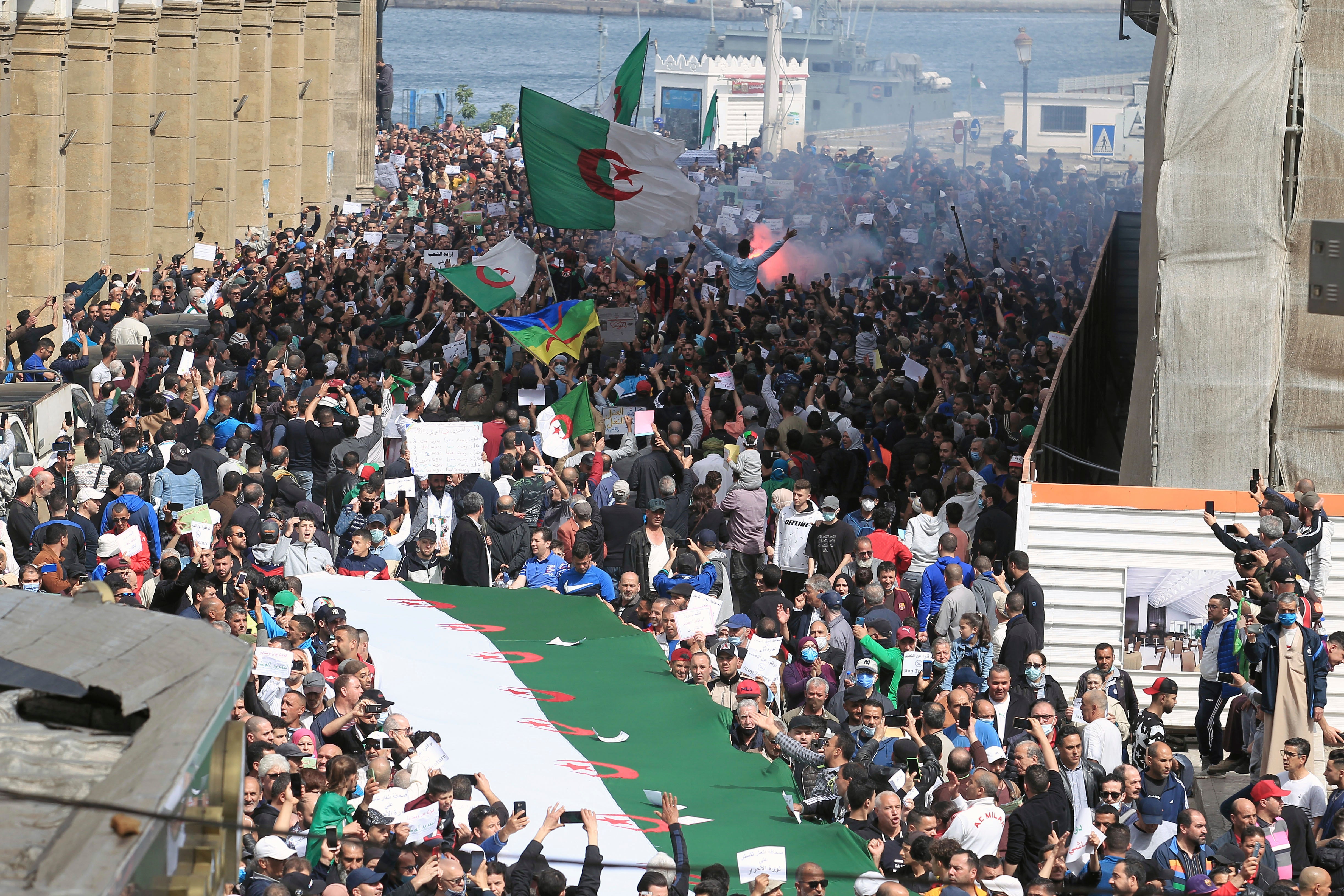Hope, tension mark kickoff of Algerian election campaign
Candidates hopeful of winning one of the 407 seats in the Algerian parliament have kicked off campaigning for legislative elections in June under a new system meant to weed out corruption and open voter rolls, a major step in President Abdelmadjid Tebboune’s promise of a “new Algeria.”

Your support helps us to tell the story
From reproductive rights to climate change to Big Tech, The Independent is on the ground when the story is developing. Whether it's investigating the financials of Elon Musk's pro-Trump PAC or producing our latest documentary, 'The A Word', which shines a light on the American women fighting for reproductive rights, we know how important it is to parse out the facts from the messaging.
At such a critical moment in US history, we need reporters on the ground. Your donation allows us to keep sending journalists to speak to both sides of the story.
The Independent is trusted by Americans across the entire political spectrum. And unlike many other quality news outlets, we choose not to lock Americans out of our reporting and analysis with paywalls. We believe quality journalism should be available to everyone, paid for by those who can afford it.
Your support makes all the difference.Candidates hopeful of winning one of the 407 seats in the Algerian parliament kicked off campaigning this week for next month's legislative elections under a new system meant to weed out corruption and open voter rolls — a major step in President Abdelmadjid Tebboune’s promise of a “new Algeria.”
But a crackdown on the pro-democracy Hirak movement, with hundreds arrested around Algeria during last week's 117th Friday march, casts a pall over presidential efforts to give a new face to a nation whose army plays a backseat role in governance.
There is an unprecedented number of candidates for the June 12 vote — nearly 1,500 lists for the North African nation’s 58 regions, with hundreds of others weeded out by the Independent National Elections Authority. The voting is earlier than originally planned, after the president dissolved parliament in February. Parity between male and female candidates is among new rules governing the elections.
Hirak supporters, including parties from the so-called “democratic movement,” have vowed to boycott the first legislative voting since former President Abdelaziz Bouteflika was forced from office in April 2019 after 20 years in power. It was pressure from marchers of the Hirak movement and from the army chief at the time that decided Bouteflika's fate.
The current army chief, Gen. Said Chanegriha, warned on Wednesday “adventurers, whatever their (political) obedience or ideological views, against any attempts to attack national unity.” He vowed that “abject designs” would be uncovered, but gave no hint which “adventurers” he might have in mind.
The speech came a day after the High Security Council decided to name two groups that take part in Hirak marches as “terrorist organizations" — Rachad, whose leaders are in Europe, and the Movement for Self-Determination of Kabylie, the home of Berbers. Rachad is alleged to have links with a banned Islamist party, which it denies.
The tide turned on Hirak when protesters returned to the streets Feb. 22 after a yearlong pause to its Friday marches due to the coronavirus. The marches have drawn fewer supporters than in their first year as rumors of the presence of militants from Rachad mounted, along with arrests by security forces.
Earlier this month, the Interior Ministry ordered Hirak to get authorization for marches and specify the march route and organizers.
For political scientist Noureddine Grime, the order showcases the government’s determination to do away with Hirak. “The organizers of the demonstrations are the Algerian people,” he said.
Among those arrested, numerous protesters are being held for attacking national unity.
Among them is Kenza Khettou, a reporter for Radio M, arrested at last week’s march and awaiting trial Tuesday on that and other charges, according to the daily El Watan. Another well-known journalist who risks an eventual trial for attacking national unity is El Kadi Ihsane, head of Radio M and the online publication Maghreb Emergent, according to local media. He allegedly was on the radar for an article he wrote about the group Rachad.
President Tebboune has worked to clean up Algerian politics in what appears to be in part a bid to appease protesters of Hirak. Corruption flourished under Bouteflika, and numerous people linked to the regime have been jailed, including Bouteflika's brother.
Campaigning to choose new lawmakers began on Thursday for the many hopefuls — 1,483 candidates’ lists, with 646 representing political parties and 837 independents, including young people and women.
“The massive participation of youth, university teachers, women has confused the enemies of Algeria,” Communications Minister Amar Belhimer said Thursday on national radio, renewing suggestions of a hidden plot against the nation.